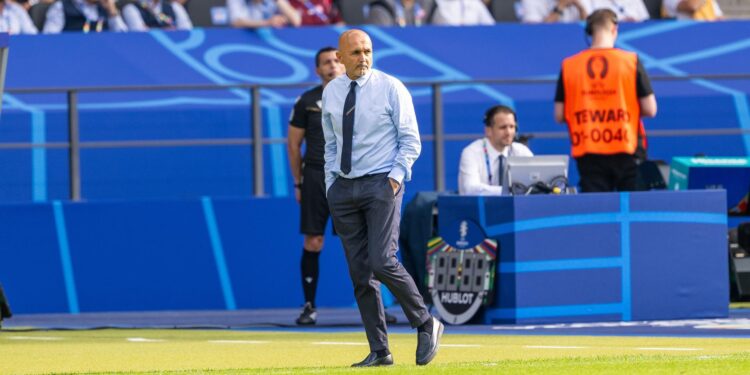In a surprising turn of events, Italy’s national football team manager Luciano Spalletti publicly disclosed his own dismissal during a recent news conference, sending shockwaves through the football community. The revelation, confirmed by the BBC, marks an unexpected development in the tumultuous management of the Azzurri, raising questions about the future direction of one of world football’s most storied teams.
Luciano Spalletti Opens Up on Italy National Team Departure During Press Briefing
Luciano Spalletti, the former Italy national team coach, spoke candidly during a recent press briefing about the circumstances surrounding his unexpected departure. Addressing the media with a composed demeanor, Spalletti admitted that he was personally informed of his sacking ahead of public announcements, a move that caught many by surprise. He reflected on the challenges of managing a national side amidst high expectations and intense scrutiny, emphasizing his commitment to the role despite the brief tenure.
During the session, Spalletti outlined key moments that defined his time with the Azzurri, including:
- Tactical adaptations aimed at modernizing Italy’s playing style
- Efforts to integrate younger talents into the squad
- Handling the pressures of World Cup qualifiers
He also shared insights into the emotional impact of the decision, highlighting the unpredictability of football management at the highest level.
| Aspect | Spalletti’s Perspective |
|---|---|
| Communication of Sacking | Personal notification before public disclosure |
| Team Strategy | Focus on youthful energy and tactical flexibility |
| Pressure | High expectations from federation and fans |
Analyzing the Impact of Spalletti’s Sacking on Italy’s Tactical Approach and Squad Morale
The unexpected departure of Luciano Spalletti has sent ripples through the Italian national team, prompting an immediate reassessment of their tactical framework. Under Spalletti’s guidance, Italy embraced a fluid 4-3-3 formation that emphasized quick transitions and aggressive pressing. His sacking has raised questions about whether the incoming management will retain this dynamic style or pivot towards a more conservative setup, potentially altering the balance between defensive solidity and attacking freedom. Early insights suggest the coaching staff is exploring a shift towards a 3-5-2 formation, aiming to strengthen midfield control and allow greater defensive cover-particularly to address vulnerabilities exposed in recent matches.
- Midfield Reinforcement: Increasing central presence to disrupt opposition build-up.
- Wing-back Utilization: Adding width and support for forwards without compromising defense.
- Pressing Intensity: Adjusting from high press to situational containment based on game context.
Beyond tactics, squad morale has encountered a palpable shift. Players close to Spalletti have expressed feelings of uncertainty, as his direct communication style and player-focused approach had fostered strong camaraderie within the locker room. The abrupt nature of his exit means the team now faces a psychological test, balancing grief with renewed motivation. According to insiders, leadership figures like Leonardo Bonucci and Marco Verratti are taking active roles in stabilizing morale, emphasizing unity and the collective goal ahead. This transition phase will be critical in determining Italy’s cohesion and performance in upcoming fixtures.
| Factor | Before Sacking | After Sacking |
|---|---|---|
| Tactical Formation | 4-3-3 aggressive press | Potential 3-5-2 conservative hold |
| Locker Room Atmosphere | High trust, clear direction | Uncertainty, search for new leadership |
| Player Confidence | Stable under Spalletti | Mixed reactions, adapting to change |
Expert Recommendations for Italy’s Next Coaching Appointment and Strategic Direction
In the wake of Luciano Spalletti’s unexpected revelation about his own dismissal, football pundits and analysts have intensified discussions regarding the future leadership of Italy’s national team. Consensus highlights the urgent need for a coach who not only commands tactical brilliance but also possesses the ability to reinvigorate a squad in transition. Key qualities emphasized include adaptability to modern football trends, a proven track record in nurturing young talent, and a diplomatic approach to managing high-profile personalities within the Azzurri setup.
Experts have also underscored a strategic pivot for the team’s style of play. Rather than adhering strictly to traditional Italian defensive solidity, there is a growing appetite for integrating:
- Dynamic attacking football that leverages Italy’s emerging offensive talents
- Flexible formations that can adjust fluidly according to in-game scenarios
- Enhanced mental resilience fostering composure in high-stakes matches
| Candidate Profile | Strengths | Potential Challenges | ||||||||
|---|---|---|---|---|---|---|---|---|---|---|
| Emerging Domestic Coach | Strong understanding of Serie A Long-term engagement with youth setups | Limited international experience | ||||||||
| Proven Foreign Coach | Innovative tactics Exposure to diverse football cultures | Adapting to Italian football traditions | ||||||||
| Former Player Turned Manager | Strong rapport with players Deep knowledge of national team It looks like the last table row in your HTML snippet got cut off. Here’s the complete version of the last row and a cleaned-up full example incorporating your content with consistent formatting: “`html In the wake of Luciano Spalletti’s unexpected revelation about his own dismissal, football pundits and analysts have intensified discussions regarding the future leadership of Italy’s national team. Consensus highlights the urgent need for a coach who not only commands tactical brilliance but also possesses the ability to reinvigorate a squad in transition. Key qualities emphasized include adaptability to modern football trends, a proven track record in nurturing young talent, and a diplomatic approach to managing high-profile personalities within the Azzurri setup. Experts have also underscored a strategic pivot for the team’s style of play. Rather than adhering strictly to traditional Italian defensive solidity, there is a growing appetite for integrating:
|
















